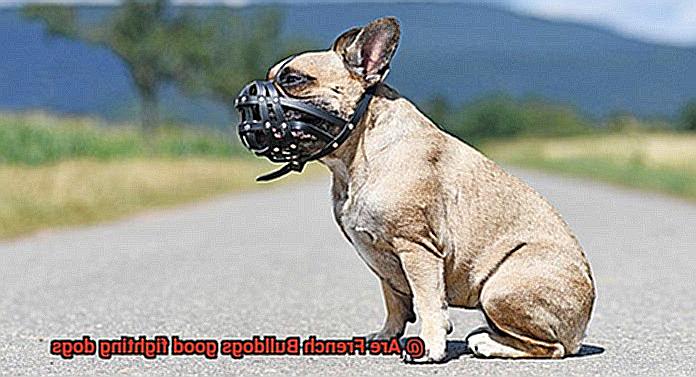Are French Bulldogs good fighting dogs?
Think of a fighting dog, and the image that comes to mind probably isn’t a squish-faced, floppy-eared French Bulldog. But hold your horses. There’s a lot more to these little bundles of joy than meets the eye. As an expert in all things dog-related, I’m here to set the record straight once and for all: Are French Bulldogs good fighting dogs?
Let’s face it – Frenchies are known for their cuteness overload. Those bat-like ears, those wrinkly faces, and don’t even get me started on their expressive personalities. It’s easy to see why they’re adored as lovable companions. But could there be a hidden warrior lurking beneath those adorable features?
In this no-nonsense analysis, we’re diving deep into the genetics, temperament, and historical background of French Bulldogs. We’re busting myths left and right, revealing the true colors of this breed. So buckle up and join me on this wild ride as we separate fact from fiction and uncover what French Bulldogs are really made of when it comes to battling it out.
Physical Build of French Bulldogs: Are They Suitable for Fighting?
Contents
- 1 Physical Build of French Bulldogs: Are They Suitable for Fighting?
- 2 Temperament of French Bulldogs: Are They Prone to Aggression?
- 3 Health Issues in French Bulldogs: Are They at Risk During Fights?
- 4 Dog Fighting Laws and Regulations: What are the Consequences?
- 5 Breeds Better Suited for Fighting: What are the Alternatives?
- 6 Training a French Bulldog for Fighting: Is it Possible?
- 7 Pros and Cons of Owning a French Bulldog as a Fighter
- 8 Ethical Considerations of Dog Fighting: Is it Right or Wrong?
- 9 Conclusion
Their physical build is not suited for the brutal world of dog fighting. In this article, we will explore the unique features of French Bulldogs that make them unsuitable for fighting, focusing on their small size, brachycephalic face structure, limited agility, and friendly temperament.
Size:
French Bulldogs are small in size compared to other breeds commonly used in dog fighting. Weighing between 16-28 pounds and standing at around 11-12 inches tall, they lack the physical presence and intimidation required in a fighting scenario. Their compact and muscular build may give them strength, but it cannot compensate for their smaller stature.
Brachycephalic Face Structure:
The adorable short-muzzled face of French Bulldogs may be endearing, but it comes with health risks. The brachycephalic structure restricts their airways, making it difficult for them to breathe properly. This puts them at a disadvantage during intense physical activities like fighting, as they quickly become exhausted and struggle to maintain stamina.
Limited Agility:
French Bulldogs have a compact and stocky frame, which limits their agility and speed. Unlike fighting dogs that need to be quick on their feet and maneuver swiftly to overpower opponents, French Bulldogs are better suited for activities that do not require high levels of agility or speed.
Friendly Temperament:
One of the defining characteristics of French Bulldogs is their friendly and non-aggressive nature. They are known for being sociable and gentle companions rather than combative fighters. Their friendly temperament makes them unsuitable for the aggressive behavior required in dog fighting.
Temperament of French Bulldogs: Are They Prone to Aggression?
Today, let’s dive into the topic of French Bulldogs and their temperament. Are these cute little pups prone to aggression? Well, grab a cup of coffee and let’s find out together.
French Bulldogs are known for being friendly and affectionate. They’re like little balls of love, always ready to snuggle up with their owners. But just like any other breed, individual temperaments can vary.
So, while it’s not common for French Bulldogs to be aggressive, it’s not unheard of either.
Now, before you start worrying about your Frenchie turning into a ferocious beast, let me reassure you that aggression in French Bulldogs is often a result of improper training or socialization.
These dogs are sensitive souls, and if they’re not properly exposed to different people, animals, and environments from a young age, they may develop fear-based aggression.
So, how can you prevent aggression in your furry friend? Well, here are some tips that can help:
- Early socialization: Start exposing your French Bulldog to various situations and people from a young age. Take them to the park, introduce them to other dogs, and let them interact with different people. This will help them learn how to appropriately react and handle different stimuli.
- Positive reinforcement training: Use positive reinforcement techniques, such as treats and praise, to reward good behavior. This will help build a strong bond with your Frenchie and teach them that good things happen when they behave well.
- Supervise interactions: While French Bulldogs are generally good with children and other pets, it’s always important to supervise their interactions. This is especially true when it comes to young children who may not understand how to properly interact with a dog.
- Look out for signs of discomfort: Remember that aggression can sometimes be a sign of an underlying health issue or pain. If your Frenchie suddenly starts displaying aggressive behavior, it’s a good idea to consult with a veterinarian to rule out any medical causes.
So, there you have it, folks. French Bulldogs are not typically aggressive, but it’s important to provide them with the right training, socialization, and care to prevent any aggressive behaviors from developing. Remember, these adorable little pups just want to be loved and cuddled. Let’s give them the happy and peaceful lives they deserve.
Health Issues in French Bulldogs: Are They at Risk During Fights?
As much as we adore our French Bulldogs for their friendly and affectionate nature, it’s important to recognize that they can still be at risk of injuries during fights. In this article, we will explore the specific health issues that make French Bulldogs vulnerable during altercations and discuss ways to keep them safe.
- Brachycephalic Syndrome: French Bulldogs are known for their adorable flat faces, but this characteristic also puts them at risk of brachycephalic syndrome. This condition affects their breathing, making it difficult for them to cool down and breathe efficiently during physical exertion like fighting.
- Overheating: Due to their compromised respiratory systems, French Bulldogs are prone to overheating. Engaging in fights can cause excessive panting and increase their body temperature significantly, putting them at a higher risk of heat stroke, which can be life-threatening.
- Spinal Issues: French Bulldogs are also prone to spinal issues such as intervertebral disc disease. The impact and strain of fighting can worsen these conditions, potentially leading to paralysis or severe pain.
- Eye Problems: Eye problems are common in French Bulldogs, including cherry eye, corneal ulcers, and dry eyes. Scratches or injuries to the eyes during fights can worsen these conditions and lead to long-term complications.
- Fractures and Dislocations: Due to their compact size and weight, French Bulldogs may be more susceptible to fractures or dislocations during fights.
To protect your French Bulldog from these health risks, it is crucial to avoid putting them in situations where fights are likely to occur. Proper socialization and training can help prevent aggression towards other dogs.
Regular veterinary check-ups are essential for monitoring your Frenchie’s overall health and identifying any pre-existing conditions that may be exacerbated during fights. Additionally, providing a cool and comfortable environment, especially during hot weather, can help prevent overheating and related complications.
Dog Fighting Laws and Regulations: What are the Consequences?
Dog fighting is not only illegal but also inhumane, and the laws and regulations surrounding this barbaric activity aim to deter individuals from participating in it. In this article, we will explore the severe consequences that those involved in dog fighting may face.
Felony Offense:
Dog fighting is considered a felony offense in many countries, including the United States. This means that individuals convicted of engaging in or organizing dog fights can face serious penalties, which may include hefty fines and imprisonment. These consequences are put in place to ensure that those responsible for such cruel acts are held accountable.
Forfeiture of Animals:
In addition to fines and imprisonment, individuals involved in dog fighting may also have their animals forfeited. This means that the dogs used in fights can be taken away from their owners and placed in the care of animal welfare organizations or loving homes where they can receive the care and compassion they deserve.
Animal Welfare Act (AWA):
The Animal Welfare Act (AWA) is the primary federal law in the United States that addresses dog fighting. Under this act, it is illegal to transport, buy, sell, possess, or train dogs for the purpose of fighting. Attending dog fights as a spectator or providing facilities for staging dog fights is also prohibited. Violating the AWA can result in severe legal consequences.
State Laws:
State laws further strengthen the regulation of dog fighting. For example, states like California and New York have enacted laws that not only classify engaging in dog fighting as a felony but also impose mandatory minimum sentences for those convicted.
Some states have gone even further by making it illegal to possess any materials associated with dog fighting, such as training equipment or videos.
Law Enforcement and Animal Welfare Organizations:
Law enforcement agencies have dedicated units to investigate and prosecute individuals involved in dog fighting.
These units work closely with animal welfare organizations and local communities to gather evidence and build cases against those responsible for organizing or participating in dog fights. Their goal is to ensure that justice is served and to protect innocent animals from further harm.
Restrictions on Animal Ownership:
Individuals convicted of dog fighting may face restrictions on owning animals for a certain period of time or permanently. This is done to prevent them from subjecting other animals to cruelty or exploitation. It serves as a way to safeguard the well-being of animals and prevent future incidents of dog fighting.
Civil Lawsuits:
Apart from legal consequences, individuals involved in dog fighting may also face civil lawsuits from animal welfare organizations or individuals seeking compensation for the harm caused to the animals involved. These lawsuits can result in significant financial damages and further tarnish the reputation of those involved.
Breeds Better Suited for Fighting: What are the Alternatives?
Dog fighting is an unethical and cruel activity that poses serious harm to animals. As responsible dog owners, it is our duty to promote a safe and healthy canine lifestyle. In this blog post, we will explore alternative activities and breeds that are better suited for our French Bulldogs, ensuring their well-being and happiness.
Dog Sports:
Engaging in dog sports is a great way to provide mental and physical stimulation for your French Bulldog while strengthening the bond between you and your furry friend. Consider participating in activities such as agility, obedience, or flyball. Breeds like Border Collies, Australian Shepherds, and German Shepherds excel in these sports due to their intelligence, athleticism, and trainability.
Scent Detection Work and Search and Rescue Training:
Tap into your French Bulldog’s natural instincts by engaging in scent detection work or search and rescue training. Breeds like Bloodhounds, Labrador Retrievers, and Belgian Malinois have exceptional olfactory abilities and are often employed in search and rescue operations. These activities provide a meaningful purpose and rewarding experience for both you and your dog.
Therapy Work:
If you prefer more relaxed activities, consider engaging your French Bulldog in therapy work. Breeds such as Golden Retrievers, Great Danes, and Newfoundland dogs are known for their gentle nature and make wonderful therapy dogs. They bring comfort and joy to people in hospitals, nursing homes, and schools, spreading happiness wherever they go.

Choosing the Right Breed:
When considering a new dog breed or companion for your French Bulldog, it is essential to research their temperament, energy level, and compatibility with your lifestyle. Some breeds may be better suited for families with children, while others may thrive in quieter environments with fewer distractions. Consulting reputable breeders or rescue organizations can help guide you towards finding a dog that matches your preferences and lifestyle.
Training a French Bulldog for Fighting: Is it Possible?
French Bulldogs are a beloved companion breed known for their friendly and sociable nature. They are not bred or suited for fighting and attempting to train them for such purposes is both unethical and illegal in many countries. As an expert in dog training, I can confidently say that training a French Bulldog for fighting is not recommended. Here’s why:
- Physical Limitations: French Bulldogs have a stocky build, short muzzle, and respiratory issues, which can make them more prone to health problems in high-stress situations. Their body structure is not built for intense physical activity or aggression required in dogfighting.
- Gentle Temperament: French Bulldogs are known for their calm and gentle temperament. They are not naturally aggressive or territorial, which are traits often sought after in fighting dogs. Their friendly nature makes them better suited for companionship and family life rather than engaging in fights.
- Positive Reinforcement Training: French Bulldogs respond best to positive reinforcement training methods that focus on building a strong bond with their owners and promoting good behavior. Training them for fighting goes against these principles and can lead to behavioral issues and emotional distress.
- Legal and Ethical Consequences: Engaging in any form of dogfighting is considered animal cruelty and can have severe legal consequences. It is important to respect the well-being of animals and promote responsible pet ownership.
Instead of training a French Bulldog for fighting, owners should focus on providing proper socialization, obedience training, and mental stimulation to ensure their pet’s well-being. Activities such as agility or obedience competitions can be a fun and rewarding alternative that taps into their natural abilities without compromising their safety and happiness.
Pros and Cons of Owning a French Bulldog as a Fighter
French Bulldogs are known for their friendly and sociable nature, making them beloved companions to many families. However, some may wonder if these adorable pups can also excel in the world of dog fighting. In this article, we will explore the pros and cons of owning a French Bulldog as a fighter, shedding light on important considerations that every potential owner should keep in mind.
Pros:
Size and Strength:
French Bulldogs may be small in stature, but don’t let their size fool you. These muscular little dogs possess impressive strength for their compact bodies, making them surprisingly agile and powerful in a fight.
Intelligent and Trainable:
French Bulldogs are highly intelligent and trainable, which means they can learn various fighting techniques and commands quickly. With the right training and socialization, they have the potential to become skilled fighters.
Loyalty and Protective Nature:
French Bulldogs are renowned for their loyalty to their owners. This loyalty, combined with their protective instinct, can make them highly committed fighters who will go above and beyond to please their owners.
Cons:
Health Concerns:
One significant drawback of owning a French Bulldog as a fighter is their susceptibility to health issues. Their brachycephalic (short-nosed) structure can lead to respiratory problems and difficulty breathing during intense physical activity. Engaging in fights can exacerbate these health issues, putting their well-being at risk.
Temperament:
While French Bulldogs are generally friendly and affectionate, they are not naturally aggressive dogs. Their easy-going nature can make it challenging to instill the level of aggression required for dog fighting. Additionally, they may experience anxiety or stress when exposed to high-pressure situations, affecting their performance in fights.
Legal and Ethical Concerns:
Dog fighting is not only illegal in most countries but is also widely considered unethical due to the harm it inflicts on animals. Owning a French Bulldog as a fighter raises serious legal and moral concerns regarding the welfare of the dog and the perpetuation of this illegal activity. It is crucial to consider the legal ramifications and moral implications before engaging in such activities.
Ethical Considerations of Dog Fighting: Is it Right or Wrong?
Today, we embark on a thought-provoking journey as we explore the ethical considerations surrounding the controversial practice of dog fighting. As responsible and caring dog owners, it is crucial that we understand the inherent wrongness of this brutal activity.
The Suffering of our Beloved Companions
French Bulldogs, with their affectionate nature and love for human companionship, are far from being natural fighters. While their strong build may deceive some into thinking they have a fighting spirit, it is important to remember that dogs are social creatures who thrive on love and connection.
Forcing them into violent confrontations goes against their very essence and can result in severe physical and psychological harm. Our beloved Frenchies deserve a life filled with love and care, not one marred by pain and suffering.
Exploitation for Profit and Entertainment
Our furry friends bring us immeasurable joy and companionship. However, in the world of dog fighting, these precious beings are exploited for profit and entertained at the expense of their well-being.
Dog fights are often accompanied by gambling activities that drive individuals to participate in this cruel practice. By treating dogs as mere sources of financial gain and amusement, we disregard their intrinsic value as sentient beings capable of experiencing pain and emotion.
As French Bulldog owners, we must vehemently oppose any activity that exploits our beloved companions for personal gain.
The Impact on Society
Dog fighting perpetuates a culture of violence and cruelty towards animals. It desensitizes individuals to the suffering of animals and normalizes violence as a form of entertainment.
This lack of empathy can have far-reaching effects, potentially translating into other forms of mistreatment or violence within society. As French Bulldog owners who embrace compassion and empathy, we have a moral responsibility to advocate against dog fighting and promote a society where animals are treated with kindness and respect.
EvweYG93oF0″ >
Conclusion
In conclusion, it is unequivocally false to claim that French Bulldogs are good fighting dogs.
Not only do they lack the physical attributes necessary for combat, but their gentle and friendly nature makes them ill-suited for such aggressive activities. French Bulldogs were bred to be companion animals, not fighters.
Their small size, short snouts, and compact bodies are better suited for cuddling on the couch than engaging in brutal battles. Furthermore, their docile temperament and love for human companionship make them more inclined to seek affection rather than confrontation.
It is important to remember that promoting dog fighting or any form of animal cruelty is not only unethical but also illegal in many jurisdictions.




